Gen Zen: Does forest bathing work in Singapore's tropical greenery?
SINGAPORE — As I pried my eyes open, the tranquillity I was experiencing was instantly replaced with the sound of tourists exploring the Singapore Botanic Gardens and some cheers from a wedding photoshoot.
I was momentarily confused and slightly disoriented — a moment ago, I had felt completely alone as if in a dark (but pleasant) vacuum.
How could time and my mental churn have stopped in the middle of a work day? And especially while sitting cross-legged right smack in the middle of a tourist attraction?
It seems that forest bathing, also known as forest therapy or shinrin-yoku, does work even in a city with limited greenery.
The practice was created in Japan in the 1980s to help people relax away from the hustle of city life by inviting them into a nature space, such as a forest, to meditate.
It has started to gain traction here in Singapore now, with several forest therapy guides telling TODAY that they have seen increased demand.
This is because a growing number of people are looking to get more in touch with nature after being cooped up at home during the Covid-19 pandemic, they said.
When I first heard about this practice, I was sceptical. Singapore does not have many deep, lush forests and anything slightly resembling one is usually full of hikers or joggers.
Besides, sitting still in a hot and humid space did not seem like the best setting to clear one's mind.
However, I decided to give it a chance. After all, what is the worst that could happen apart from some insect bites?
BASKING IN NATURE
At about 9am on Friday, I met forest therapy guide Khloe Teo at the Singapore Botanic Gardens with several other participants looking for some respite.
While seated on mats laid under a tree near the Bandstand area, Ms Teo, 38, guided us through the meditative process, which she called "invitations".
To start, she invited us to close our eyes and prompted us to focus on our other senses.
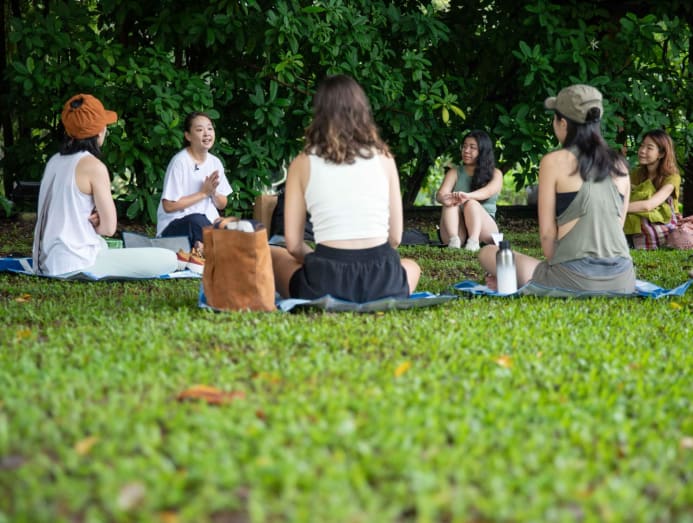
I took a while to move my focus and thoughts from work and life to what had always been more like "background noises".
Soon, the sound of the leaves rustling in the wind, the feeling of the cold earth beneath the grass and the smell of morning dew distracted my mind from my usual thoughts.
Throughout the session, Ms Teo would guide us with a calm, soothing voice on what senses to focus on and attune our minds to specific sensations.
It was not long before I was fully immersed in my immediate surroundings.
About 30 minutes later, Ms Teo instructed us to open our eyes. To my surprise, what I thought was a once quiet garden was filled with tourists and a couple taking their wedding photos at the nearby pavilion.
We were then asked by Ms Teo to take our time and explore "movement" around the garden.
I found watching birds flying and clouds drifting in the sky rather enjoyable as I lay on my mat. Some participants peered at insects crawling on the grass, while others took the theme "movement" literally and decided to walk around to the different plants in the area.
After every activity, Ms Teo would conduct a short reflection session where we took turns holding a flower or leaf and sharing our thoughts about the process.
Some talked about the struggles they faced in life, while others, like me, talked about what we observed during the session.
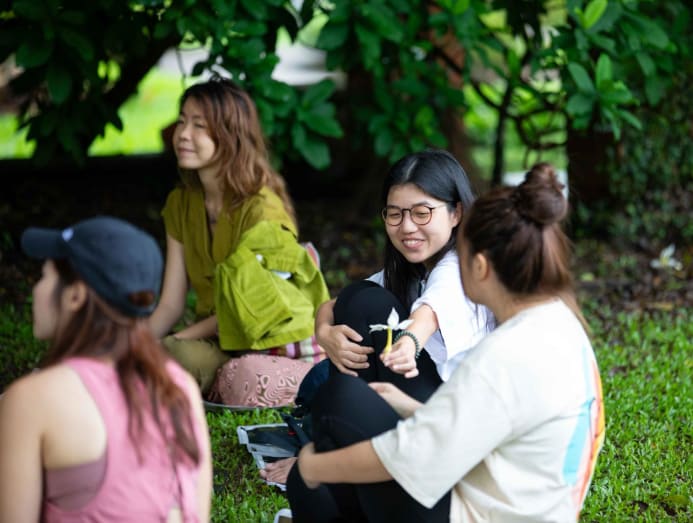
I found myself able to slow down during the experience, which has been something I struggle with daily while working in a fast-paced job.
There were also fewer distractions during the roughly two-hour-long session than when I try my 15-minute-long meditative sessions at home because in these group sessions, I was forced to put my mobile phone away and just focused on nature.
NATURE'S CALMING EFFECT
Ms Youmin Yap, believed to be Singapore's first forest therapy guide, said: "We have all these really beautiful green spaces that are alive, they are teeming with living things, but very few of us are really present to really interact or engage or encounter them."
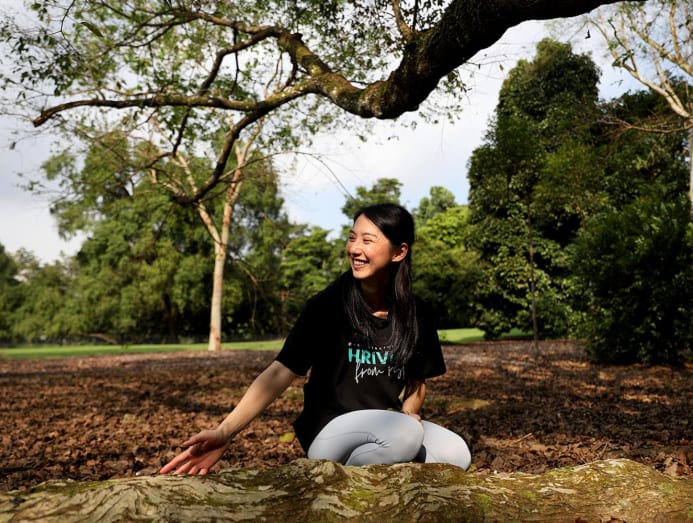
She added that this changed after the Covid-19 pandemic where everyone had to isolate at home and life slowed down.
More people are now appreciating nature and looking to spend more time in it for their physical and mental well-being, she said.
My guide, Ms Teo, is one such individual. She tried out forest bathing after suffering from a bad case of burnout in 2021 and found that the forest became her go-to, always-available "therapist".
She went for training courses and became a guide to help others to experience the same peace.
"During my sessions, I've had participants share their emotional baggage when reflecting... Seeing them feel better and happier after that strikes a chord with me," she said.
Referring to a study by researchers from the Nippon Medical School in Japan, Ms Yap said that forest therapy has a calming effect due to phytoncides, a chemical emitted by plants to protect themselves from bacteria and viruses.
"Some of the research has quantified that these phytoncides — when they enter our bodies — help to remove the stress hormones. It helps you to destress and all, boost up your immune system."
Unlike a typical stroll in a park, forest therapy provides a "fully immersive and sensorial forest therapy experience", Ms Yap added.
With a fully immersive experience, people are able to reflect on themselves more and slow down, she said.
Observing nature may also help to relieve some stress weighing on our minds, Ms Teo said.
Ms Michelle Neo, a clinical psychologist, said: "Studies have shown that nature and forest therapy has been associated with improvement in depressive symptoms, anxiety symptoms, as well as reductions in blood pressure and heart rate."
She added that forest bathing is prescribed by doctors in some countries to reduce stress levels and improve their quality of life.
This includes Canada, which has been allowing such directions from doctors in some provinces since 2020, according to the United Nations Educational, Scientific and Cultural Organization.
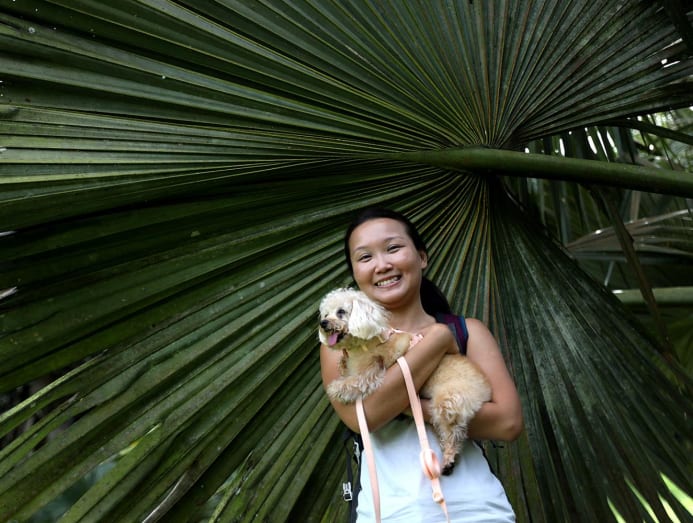
DIY FOREST BATHING?
While it might still be some time before forest bathing is considered a mainstay as therapy prescribed by doctors in Singapore, Ms Neo said that people can start doing it as part of their mental wellness journey.
A guide is helpful for first-timers who want to experience forest bathing, but people can try this out on their own thereafter, Ms Teo said.
The American Psychiatric Association reported experiencing forest bathing with a guide and doing it on your own brings about different positive results — a guided experience brings positive emotional changes while interacting with others, whereas forest bathing alone could increase focus on self-reflection.
Given that the cost of such a session may run up to S$200 depending on the guide and the class size, I tried forest bathing alone for 30 minutes to see if I could recreate that "vacuum" feeling I had at the gardens.
I made my attempt at 8am, under some trees near my home.
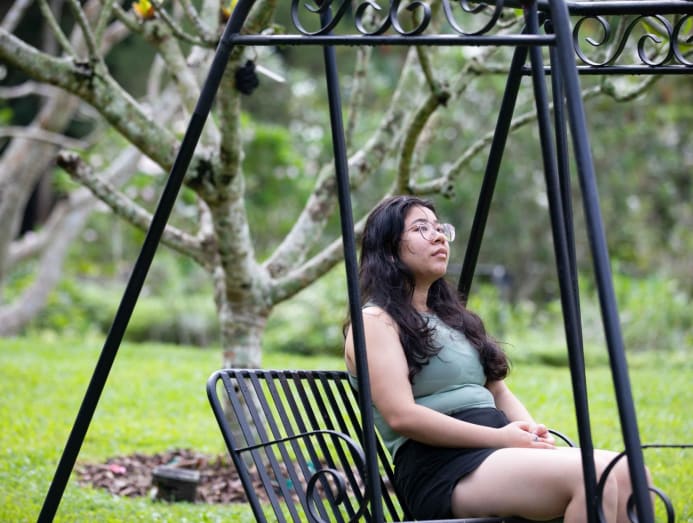
At first, I tried to touch a tree and some plants but I felt extremely self-conscious. I kept worrying that my condominium's security guard might chide me for manhandling the landscaping.
When I failed to focus on my senses and what was around me, I decided to move on to a different exercise.
But as I lay down on the grass and started to close my eyes, my neighbour came to ask me if everything was all right, much to my embarrassment.
I quickly packed up and went home, ending my session in just 10 minutes.
For now, I might splurge on a few more sessions of forest bathing to experience that calmness and peace again, before I make another attempt at hugging a tree on my own.













